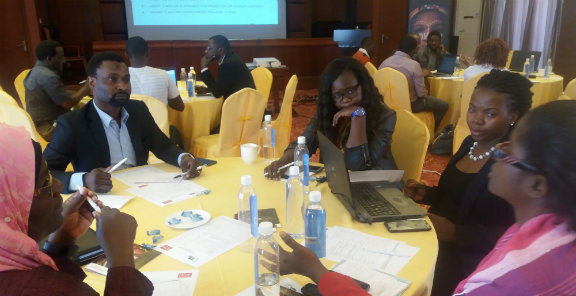Towards living wages in African horticulture value chains
On August 24 2017, the Hivos Women@Work Campaign in Southern Africa convened its stakeholders from the horticulture sector in Malawi for the first time to discuss the issue of living wages. Low wages are a persistent problem in many global supply chains, so this is a key issue for the Women@Work Campaign, which aims to improve working conditions for women.
Women benefit little from sector they dominate
As in most countries in East and Southern Africa, the horticulture sector in Malawi is a key income and export generator. Women constitute up to 70 percent of the workforce in this sector, but their benefits are meager. Earning a living wage that enables workers to meet their basic needs is a human right. However, the people growing our vegetables and flowers do not earn enough for a decent standard of living, i.e. being able to afford nutritious food, water, housing, clothing, medical care, transport and education.
The meeting in Lilongwe, Malawi brought together civil society organizations (CSOs), certification bodies, government, unions and the private sector to review a regional study on living wages commissioned by Hivos and discuss the opportunities and barriers to implementing a living wage.
New stakeholders group to advocate for a living wage
The Centre for Social Concern (CFSC), a local CSO and partner of the Women@Work Campaign, also presented its study on living wages in Malawi, after which participants outlined next steps, discussed setting sector-specific minimum wages as a pathway toward a living wage and looked at lessons that can be learned from the tea and sugar sector. The outcome of the meeting was a new stakeholders group that will work with Hivos to advocate for a living wage in Malawi within the horticulture industry.
Living Wage Lab
Hivos also seeks to introduce living wages into the African horticulture sector by cooperating with Netherlands-based stakeholders.
The Netherlands plays an important role in the horticulture sector, both at home and abroad. This key position offers a unique opportunity to also engage and influence Dutch governments, businesses and certification bodies to ensure better working conditions for these women. That is why Hivos, together with the Dutch CSO Fairfood, launched the Living Wage Lab in 2015.
The Living Wage Lab helps business and other stakeholders in the agri-food sector to take steps towards introducing living wages in their supply chains. It brings together Netherlands-based stakeholders to develop and experiment with innovative solutions to achieve this end. The Lab is attended by government bodies, growers, wholesalers, banks, CSOs, certification bodies and researchers.
This article was originally published on Hivos Southern Africa. Click here to view the original article








